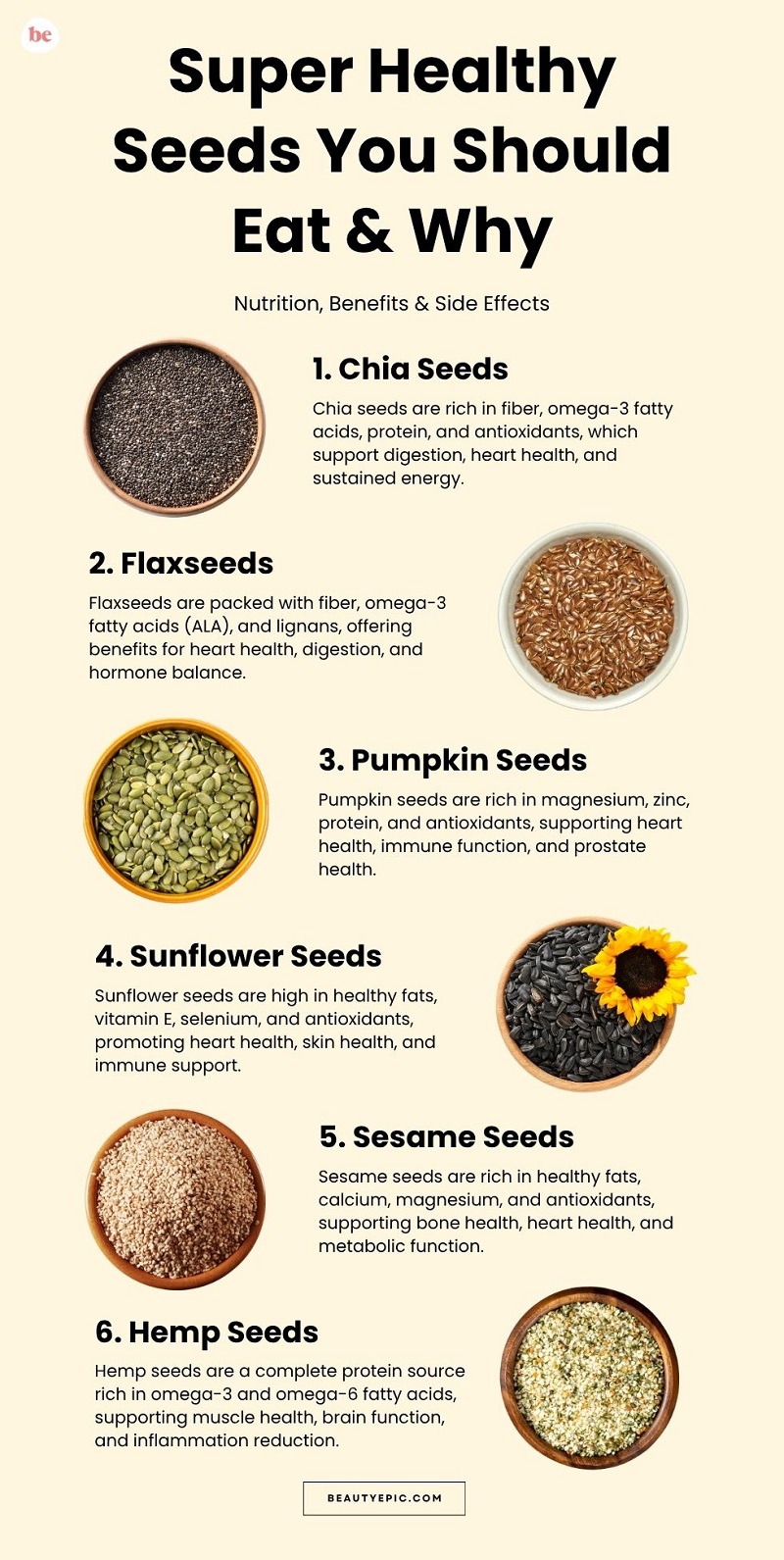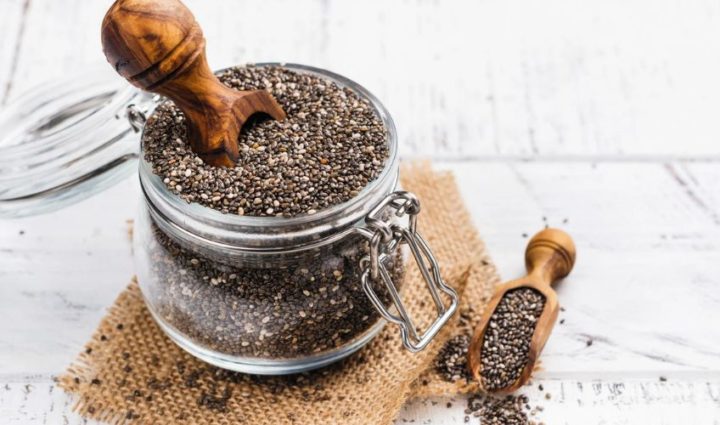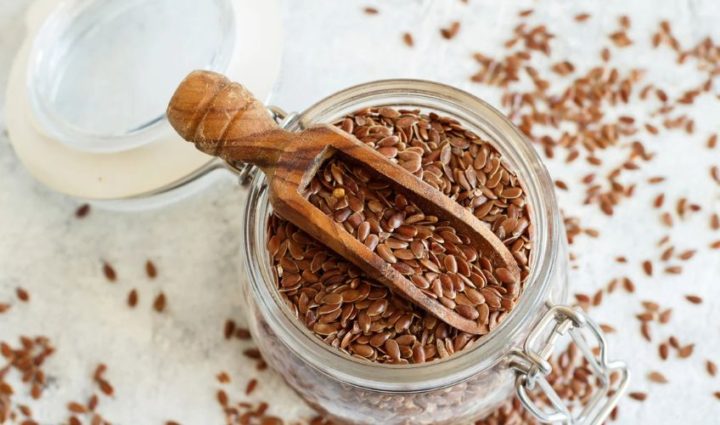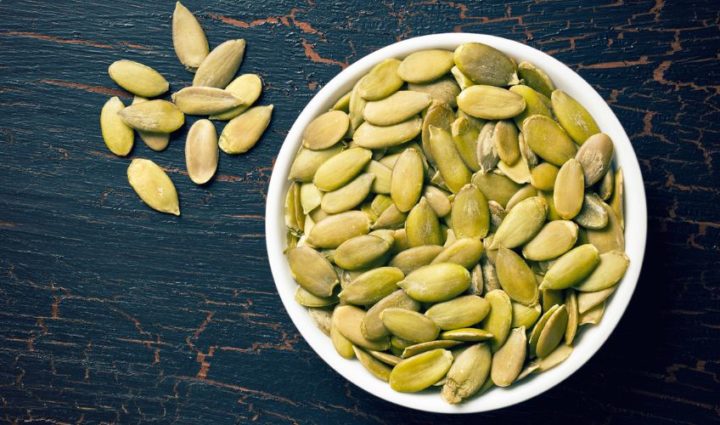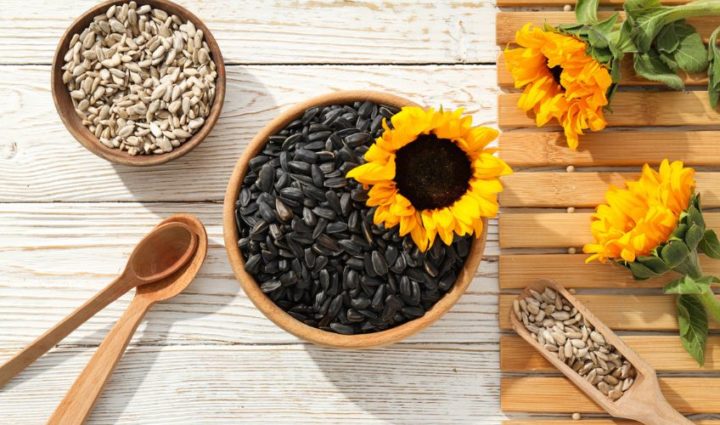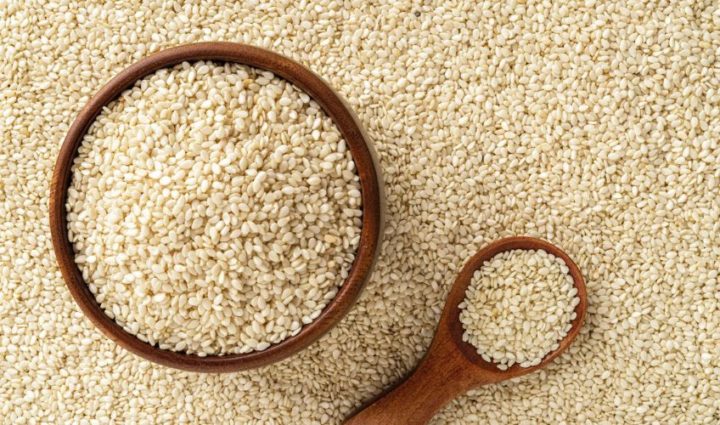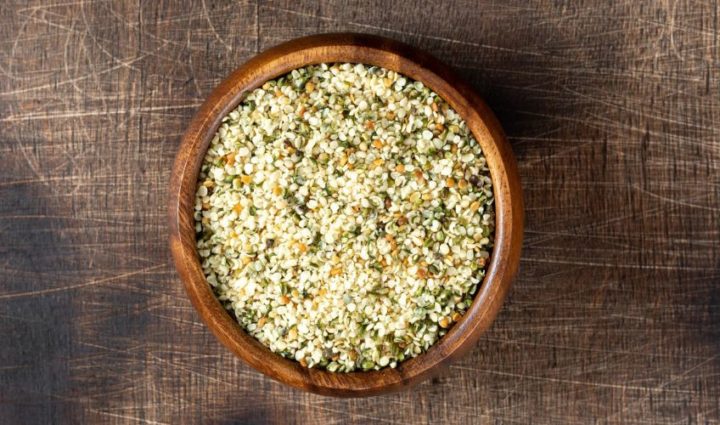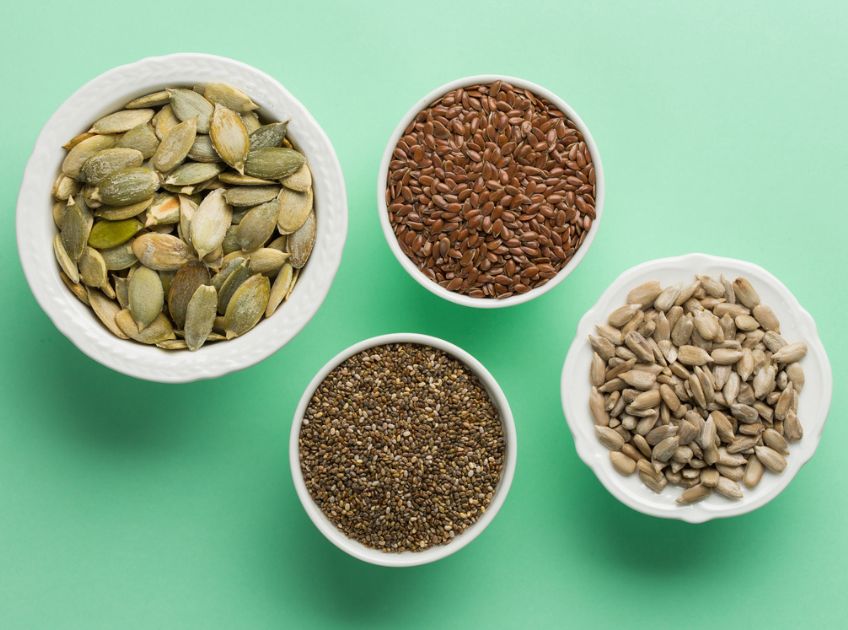
Important: This article is for informational purposes only. Please read our full disclaimer for more details.
Seeds may be small, but they are packed with nutrients that support overall health. Rich in fiber, plant-based protein, healthy fats, vitamins, minerals, and antioxidants, these little powerhouses can help improve digestion, heart health, immunity, and even weight management. Modern nutrition science strongly supports the inclusion of seeds in daily diets for long-term health.
1. Chia Seeds – The Hydration Booster
Chia seeds have gained “superfood” status, and for good reason. When soaked, they form a gel-like texture, making them perfect for smoothies, puddings, or even as an egg substitute in vegan baking.
Nutritional Value (per 100g)
| Nutrient | Amount |
|---|---|
| Calories | 486 kcal |
| Protein | 16.5 g |
| Fat | 30.7 g |
| Carbohydrates | 42.1 g |
| Fiber | 34.4 g |
| Calcium | 631 mg |
| Omega-3 (ALA) | ~17.8 g |
Health Benefits
- High fiber improves digestion and promotes satiety.
- Rich in ALA (alpha-linolenic acid) for heart and brain health.
- Supports bone strength with calcium and magnesium.
- Antioxidants help slow down skin aging.
How to Eat
- Mix into overnight oats or yogurt.
- Make chia pudding with milk/almond milk.
- Add to smoothies for extra fiber.
Side Effects
- Eating too many dry chia seeds without water may cause digestive discomfort.
- Must be consumed with adequate fluids to avoid choking.
2. Flaxseeds – The Hormone Balancer
Flaxseeds are a nutritionist’s favorite for hormone health. They’re best consumed ground because whole seeds may pass through undigested.
Nutritional Value (per 100g)
| Nutrient | Amount |
|---|---|
| Calories | 534 kcal |
| Protein | 18.3 g |
| Fat | 42.2 g |
| Carbohydrates | 28.9 g |
| Fiber | 27.3 g |
| Omega-3 (ALA) | ~22.8 g |
Health Benefits
- Rich in lignans (phytoestrogens) that may support hormonal balance in women.
- Improve cholesterol levels and heart health.
- Fiber helps regulate digestion and blood sugar.
How to Eat
- Sprinkle ground flaxseeds over salads or oatmeal.
- Add to smoothies or baked goods.
- Use as an egg substitute (1 tbsp flax + 3 tbsp water = 1 egg).
Side Effects
- May interfere with blood-thinning or hormonal medications.
- Raw, unripe flaxseeds may contain harmful compounds (avoid).
3. Pumpkin Seeds – The Mineral Powerhouse
Pumpkin seeds (also known as pepitas) are nutrient-dense and versatile. They’re a great snack option and can even be added to curries or breads.
Nutritional Value (per 100g)
| Nutrient | Amount |
|---|---|
| Calories | 559 kcal |
| Protein | 30 g |
| Fat | 49 g |
| Carbohydrates | 10.7 g |
| Fiber | 6 g |
| Magnesium | 592 mg |
| Zinc | 7.8 mg |
Health Benefits
- Excellent source of magnesium, crucial for energy and muscle function.
- Zinc boosts immunity and reproductive health.
- Contains tryptophan, which aids better sleep and mood.
- Antioxidants may reduce inflammation.
How to Eat
- Roast with spices for a crunchy snack.
- Sprinkle on soups, salads, or smoothie bowls.
- Add to granola or trail mixes.
Side Effects
- Eating in excess may cause bloating due to high fiber.
4. Sunflower Seeds – The Skin & Heart Protector
Sunflower seeds are mild, nutty, and make an excellent topping for healthy meals.
Nutritional Value (per 100g)
| Nutrient | Amount |
|---|---|
| Calories | 584 kcal |
| Protein | 20.8 g |
| Fat | 51.5 g |
| Carbohydrates | 20 g |
| Fiber | 8.6 g |
| Vitamin E | 35 mg |
| Selenium | 53 mcg |
Health Benefits
- Vitamin E is a powerful antioxidant that supports skin repair and protects cells from oxidative damage.
- Healthy unsaturated fats promote cardiovascular health.
- Selenium supports thyroid function and immune defense.
How to Eat
- Add to salads, oatmeal, or smoothie bowls.
- Blend into sunflower butter (a nut-free alternative to peanut butter).
- Enjoy as a roasted snack.
Side Effects
- Salted versions may increase sodium intake.
- Calorie-dense, so portion control is key.
5. Sesame Seeds – The Bone Builder
Sesame seeds are tiny but nutrient-dense, used in everything from tahini to Asian stir-fries.
Nutritional Value (per 100g)
| Nutrient | Amount |
|---|---|
| Calories | 573 kcal |
| Protein | 17 g |
| Fat | 49.7 g |
| Carbohydrates | 23.4 g |
| Fiber | 11.8 g |
| Calcium | 975 mg |
| Iron | 14.6 mg |
Health Benefits
- Rich in calcium and phosphorus, promoting bone strength.
- Contains sesamin and sesamolin, which have antioxidant and cholesterol-lowering effects.
- Improves skin and hair health due to zinc and B vitamins.
How to Eat
- Sprinkle on breads, salads, or stir-fries.
- Blend into tahini (used in hummus).
- Use as a topping for rice or noodles.
Side Effects
- May cause allergic reactions in sensitive individuals.
6. Hemp Seeds – The Plant Protein Star
Hemp seeds are soft, nutty, and extremely rich in plant-based protein, making them popular in vegan and vegetarian diets.
Nutritional Value (per 100g)
| Nutrient | Amount |
|---|---|
| Calories | 553 kcal |
| Protein | 31.6 g |
| Fat | 48.8 g |
| Carbohydrates | 8.7 g |
| Fiber | 4 g |
| Omega-3 & Omega-6 | ~9:3 ratio |
Health Benefits
- One of the few plant sources of complete protein, containing all essential amino acids.
- A balanced omega-3 to omega-6 ratio supports heart and brain health.
- Anti-inflammatory compounds improve skin conditions like eczema.
How to Eat
- Sprinkle on salads, smoothie bowls, or yogurt.
- Blend into protein shakes.
- Add to homemade granola or energy bars.
Side Effects
- Generally safe, but overconsumption may cause mild digestive upset.
What Science Says About Seeds
Numerous studies highlight seeds as functional foods. For instance, chia and flaxseeds are recognized for their role in heart health and cholesterol reduction (Nutrients Journal, 2021) (1)(2). Pumpkin seeds have been studied for their role in prostate health and sleep improvement (3). Sesame seeds are widely acknowledged for their calcium and antioxidant content, while hemp seeds are praised for their unique protein profile (4).
Frequently Asked Questions (FAQ’S)
Q1. How many seeds should I eat daily?
A. A small handful (2–3 tablespoons) of mixed seeds daily is enough to reap health benefits without excess calories.
Q2. Should I eat seeds raw or roasted?
A. Both are healthy, but raw seeds retain maximum nutrients. Roasting enhances flavor but may reduce some heat-sensitive antioxidants.
Q3. Can seeds help with weight loss?
A. Yes. Seeds are high in fiber and healthy fats, which promote satiety and reduce overeating. However, portion control is key.
Final Thoughts
Incorporating seeds like chia, flax, pumpkin, sunflower, sesame, and hemp into your diet can significantly improve your health. Each seed brings its own unique nutritional profile, from protein and omega-3s to minerals and antioxidants. With proven benefits supported by science, these superfoods deserve a place in your daily meals—whether sprinkled on salads, blended into smoothies, or enjoyed as a snack.
